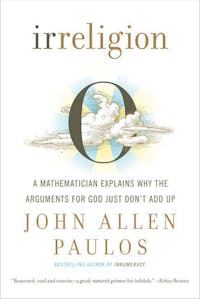Irreligion
A Mathematician Explains Why the Arguments for God Just Don't Add Up
 Download image
Download image
ISBN10: 0809059185
ISBN13: 9780809059188
Trade Paperback
176 Pages
$19.00
CA$26.00
Are there any logical reasons to believe in God? Mathematician and bestselling author John Allen Paulos thinks not. In Irreligion he presents the case for his own worldview, organizing his book into twelve chapters that refute the twelve arguments most often put forward for believing in God's existence. The latter arguments, Paulos relates in his characteristically lighthearted style, "range from what might be called golden oldies to those with a more contemporary beat. On the playlist are the firstcause argument, the argument from design, the ontological argument, arguments from faith and biblical codes, the argument from the anthropic principle, the moral universality argument, and others." Interspersed among his twelve counterarguments are remarks on a variety of irreligious themes, ranging from the nature of miracles and creationist probability to cognitive illusions and prudential wagers. Special attention is paid to topics, arguments, and questions that spring from his incredulity "not only about religion but also about others' credulity." Despite the strong influence of his day job, Paulos says, there isn't a single mathematical formula in the book.
Reviews
Praise for Irreligion
"The volume gets off to a bracing start, deftly dismantling creationist arguments that the astonishing complexity of life could have come about only through the efforts of a master designer, by succinctly showing how Darwin's theory of natural selection and free-market economics provide well-confirmed alternative explanations for the evolution of complex systems . . . Writing in clear, direct prose, Paulos shows how even everyday references to purpose and intention can be easily reformulated in scientific, nonpurposive terms."—Michiko Kakutani, The New York Times
"Paulos wades through the classical arguments for the existence of God and systematically refutes them . . . It is readable and concise, with moments of great logical rigour and dry wit."—Amanda Gefter, New Scientist magazine
"Paulos deserves high praise for turning out a book that is brief, forthright, and amiable. While making the same basic points as, say Dawkins's The God Delusion, it avoids the often choleric tone of that work, keeping a light, conversational tone where Dawkins hurls flaming rhetorical fireballs of denunciation . . . The book is organized in a way that readers inclined to skepticism but who have never seriously studied the debate over the viability of theism will find convenient and quite useful in their private debates with friends, relatives, and even clergymen of various persuasions. Paulos lays out, seriatim, most of the classical philosophical arguments for the existence of a deity, and immediately refutes them as they arise. Thus we find the ontological argument, the argument from First Clause, the argument from design, the argument from the seeming existence of moral universals, and so forth, laid out one by one and just as soon demolished. It will be noted that these chapters are as brief as they are easygoing . . . Irreligion will, I'm confident, take a distinguished place in what one might call the canonical literature of the New Atheism, and I highly recommend it, especially to bright youngsters who will find its occasional use of mathematical ideas pleasant."—Norman Levitt, Skeptic
"John Allen Paulos has written a charming book that takes you on a sojourn of flawless logic, with simple and clear examples drawn from math, science, and pop culture. At journey's end, Paulos has left you with plenty to think about, whether you are religious, irreligious, or anything in between."—Neil deGrasse Tyson, astrophysicist, American Museum of Natural History and author of Death By Black Hole and Other Cosmic Quandaries
"For years John Allen Paulos has been our guide for reading newspapers, playing the stock market, and understanding what all those graphs and charts and formulas really mean. No one knows how to dissect an argument better than Paulos. Now he has turned his rapier wit to the grandest question of them all: is there a God? Those who are religious skeptics will find in Paulos's analysis new ways of looking at both old and new arguments, and those who believe that God's existence can be proven through science, reason, and logic will have to answer to this mathematician's penetrating analysis."—Michael Shermer, Publisher of Skeptic magazine, monthly columnist for Scientific American, and the author of How We Believe, The Science of Good and Evil, and Why Darwin Matters
"Using the methods of mathematics, reason and logic, Paulos wrestles religious belief systems to the ground and in the process proves he is as good a writer as he is a mathematician. The book is short, to the point and humorous, and God knows, this subject could use more humor."—Joan Konner, Dean Emerita of the Columbia Graduate School of Journalism and editor of The Atheist's Bible
"Another virtuoso performance from a master in the use of mathematics to explore the conundrums and mysteries of everyday life."—Sylvia Nasar, author of A Beautiful Mind
"John Allen Paulos has done us all a great service. Irreligion is an elegant and timely response to the manifold ignorance that still goes by the name of 'faith' in the 21st century."—Sam Harris, author of the New York Times bestsellers, The End of Faith and Letter to a Christian Nation
"Add this impious brief to the growing stack of earnest text by atheists set on debunking the venerable notion of an omnipotent, omniscient Almighty . . . Reasoned, cool and concise."—Kirkus Reviews
Reviews from Goodreads
BOOK EXCERPTS
Read an Excerpt
Preface
Are there any logical reasons to believe in God? Billions of people over thousands of years have entertained this question, and the issue is certainly not without relevance in our world today. The chasms separating literal believers,...



